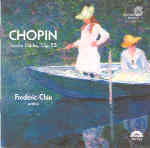Frederic Chiu completes his Chopin Etudes cycle with an alarmingly uneven presentation of Op. 25. He paints No. 1’s arpeggiated figures in tentative brushstrokes that gain power and assertion as the work progresses, despite occasional overpedaling. Too much sustain pedal blurs No. 2’s long, rapid lines and No. 6’s celebrated double thirds, while No. 5 is hyperdetailed to eccentric and clunky results. In No. 7 Chiu underplays the steady eighth-note accompaniment, leaving the poor right and left hand duetting lines to fend for themselves and lose what little shape and impetus Chiu gives them. No. 8’s double sixths may not boast Pollini’s aristocratic finesse, yet I enjoyed Chiu’s lively, assertive performance as well as his deliciously deadpan reading of the “Butterfly” Etude’s final bars. Happily Chiu is on great form in the last three etudes. No. 10 thoroughly transcends its “octave etude” status by way of Chiu’s astute melodic shaping over the barlines. No. 11, the “Winter Wind”, lets rip with tremendous sweep and uncommon clarity in the left hand. No. 12 is similarly fluid and texturally diverse. Chiu’s wonderfully crisp and lightfingered No. 4 is the prize of the set, where his highly characterized bass lines provide a dizzying, almost Schumannesque counterpoint to the off-beat right-hand melody.
Of the three Nouvelles Etudes, I most like Chiu’s simple, transparent way with the F minor. The D-flat’s rubato is a shade arch, although Chiu executes the difficult legato and staccato separation well. But the A-flat’s basic three-against-two rhythm is insufficiently articulated, with Chiu’s right-hand triplets constantly to the fore. The Berceuse is painstakingly voiced, rather stiff, and often too loud–a far cry from Perahia’s rippling delicacy and poise. To some listeners, Chiu’s unconventional on-the-beat execution of the Barcarolle’s appogiaturas (similar to Arrau’s) might go against the music’s lilting grain, but it’s actually the lack of a consistent rhythmic center that proves the pianist’s undoing. And what good are all the interesting details Chiu excavates from the Polonaise-Fantasie’s textural underbrush without a singing line on top? This is a frustrating release, but its best moments are well worth hearing.
































